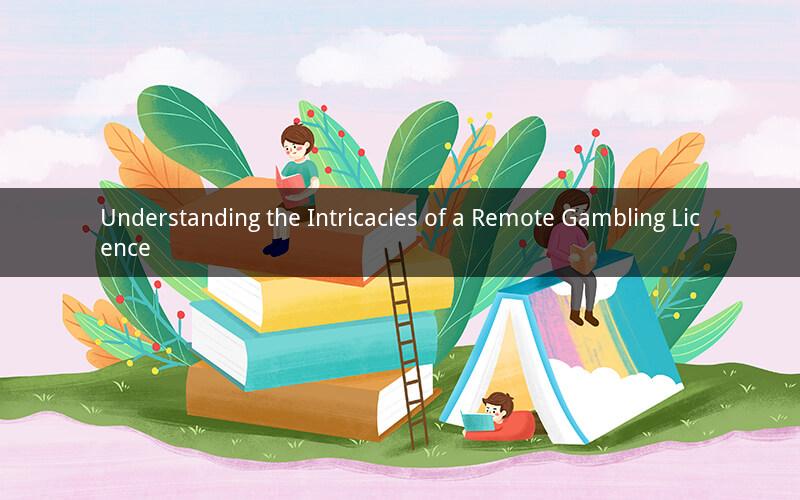
A remote gambling licence is a legal permit that allows operators to conduct gambling activities over the internet. It is a crucial component in the regulatory framework of the online gambling industry, ensuring that operators adhere to strict guidelines and standards. This article delves into the details of a remote gambling licence, its importance, and the process of obtaining one.
What is a Remote Gambling Licence?
A remote gambling licence is a permit issued by a regulatory authority that grants operators the legal right to offer gambling services to individuals within their jurisdiction. These services can include sports betting, casino games, poker, and bingo. The primary objective of a remote gambling licence is to protect consumers, ensure fair play, and prevent money laundering and other illegal activities.
Importance of a Remote Gambling Licence
1. Consumer Protection: A remote gambling licence ensures that consumers are protected from unscrupulous operators. Operators with a valid licence are required to adhere to strict regulations, including age verification, responsible gambling measures, and fair play policies.
2. Transparency: A remote gambling licence promotes transparency in the online gambling industry. Operators with a valid licence are obligated to provide clear information about their business, including ownership, licensing status, and customer support channels.
3. Market Stability: By requiring operators to obtain a remote gambling licence, regulatory authorities can maintain market stability. This helps prevent market saturation and ensures that only reputable operators are allowed to operate.
4. Revenue Generation: Remote gambling licences generate revenue for governments, which can be used to fund public services and initiatives. This revenue is often collected through licensing fees and taxes on gambling activities.
Process of Obtaining a Remote Gambling Licence
1. Eligibility Requirements: Operators must meet certain eligibility requirements to obtain a remote gambling licence. These may include having a physical presence in the jurisdiction, being a legally registered entity, and demonstrating compliance with anti-money laundering and responsible gambling regulations.
2. Application Process: Once an operator is eligible, they must submit a detailed application to the relevant regulatory authority. This application typically includes information about the operator's business, ownership structure, and compliance with relevant regulations.
3. Due Diligence: The regulatory authority conducts a thorough due diligence process to ensure that the operator meets all licensing requirements. This may involve background checks, financial audits, and site visits.
4. Licensing Decision: After the due diligence process, the regulatory authority makes a decision on whether to issue the licence. If approved, the operator is granted a remote gambling licence and can begin offering gambling services.
5. Compliance and Monitoring: Operators with a remote gambling licence are required to comply with ongoing regulatory requirements. This includes regular reporting, audits, and adherence to changes in the regulatory framework.
Benefits of a Remote Gambling Licence
1. Enhanced Reputation: Obtaining a remote gambling licence enhances an operator's reputation and credibility. Consumers are more likely to trust and engage with operators that have a valid licence.
2. Access to New Markets: A remote gambling licence allows operators to expand their business into new markets. Many jurisdictions require operators to obtain a local licence before they can offer services within that market.
3. Legal Protection: A remote gambling licence provides legal protection for operators, as they are operating within the confines of the law. This helps prevent legal disputes and fines.
4. Competitive Advantage: Operators with a remote gambling licence have a competitive advantage over unlicensed operators. They can offer services with greater confidence, knowing that they are operating legally and ethically.
5. Improved Customer Experience: A remote gambling licence ensures that operators adhere to high standards of customer service and responsible gambling. This leads to a better overall customer experience.
Frequently Asked Questions (FAQs)
1. What is the difference between a remote gambling licence and a gaming licence?
A remote gambling licence specifically pertains to online gambling activities, while a gaming licence covers both online and offline gambling operations.
2. How long does it take to obtain a remote gambling licence?
The time to obtain a remote gambling licence varies depending on the jurisdiction and the complexity of the application. It can take anywhere from a few months to over a year.
3. Can an operator obtain a remote gambling licence without a physical presence in the jurisdiction?
Some jurisdictions require operators to have a physical presence within their borders to obtain a remote gambling licence. However, others may allow operators to apply for a licence without a physical presence.
4. What happens if an operator fails to comply with the terms of their remote gambling licence?
If an operator fails to comply with the terms of their remote gambling licence, the regulatory authority may impose penalties, including fines, suspension, or revocation of the licence.
5. Can a remote gambling licence be transferred to another operator?
In most cases, a remote gambling licence cannot be transferred to another operator. The licence is usually tied to the original applicant and their business entity.